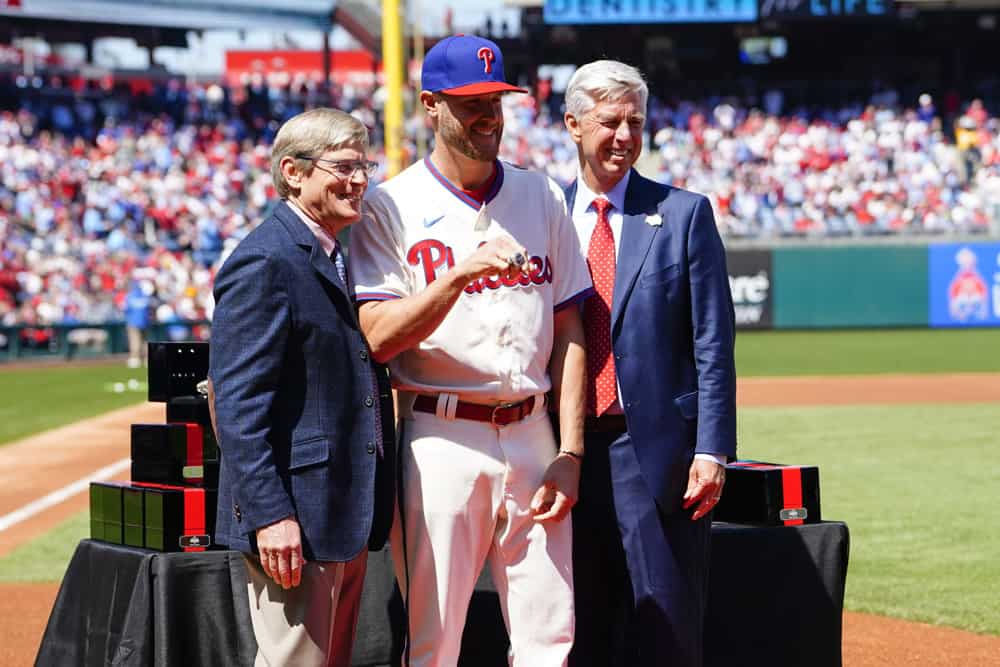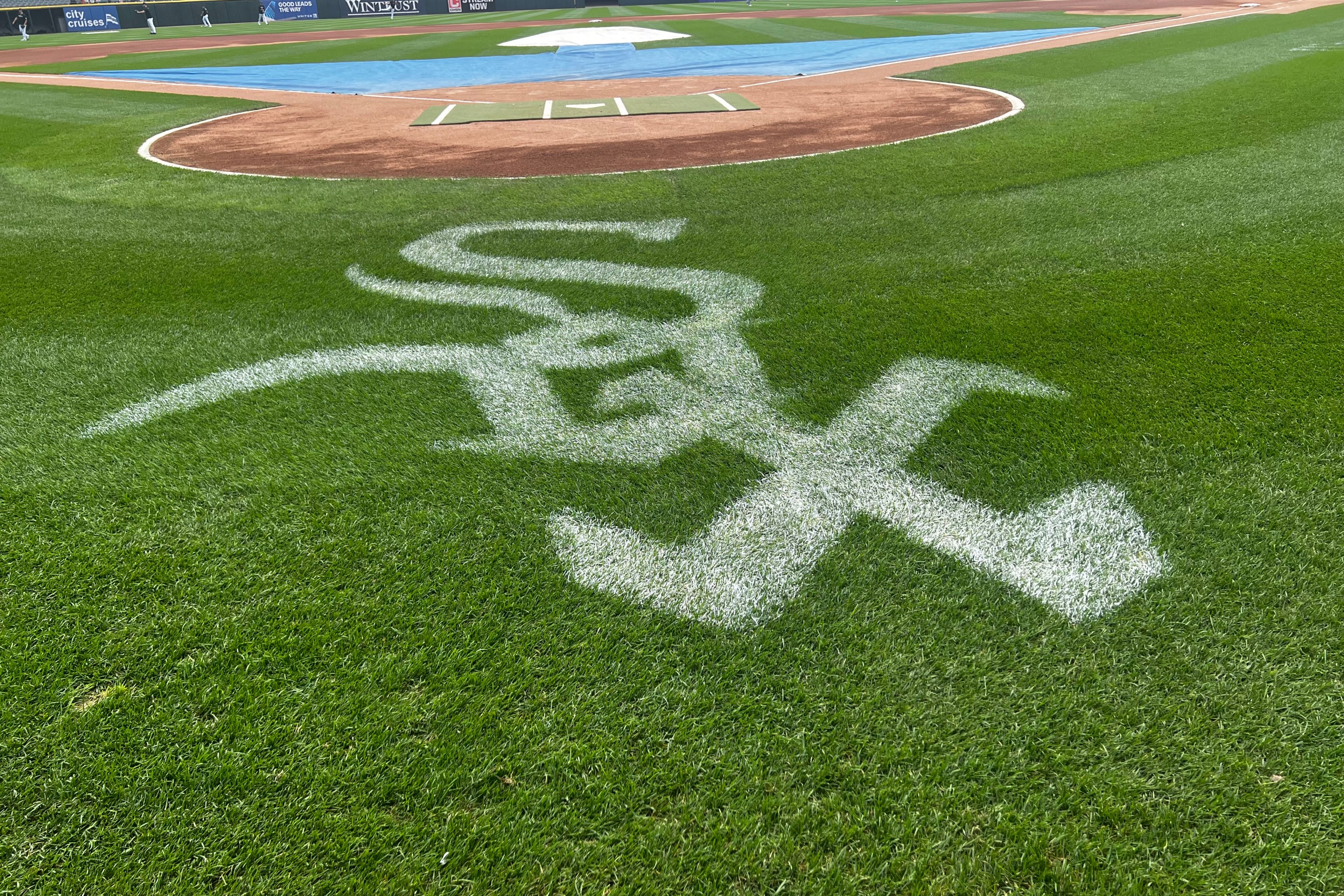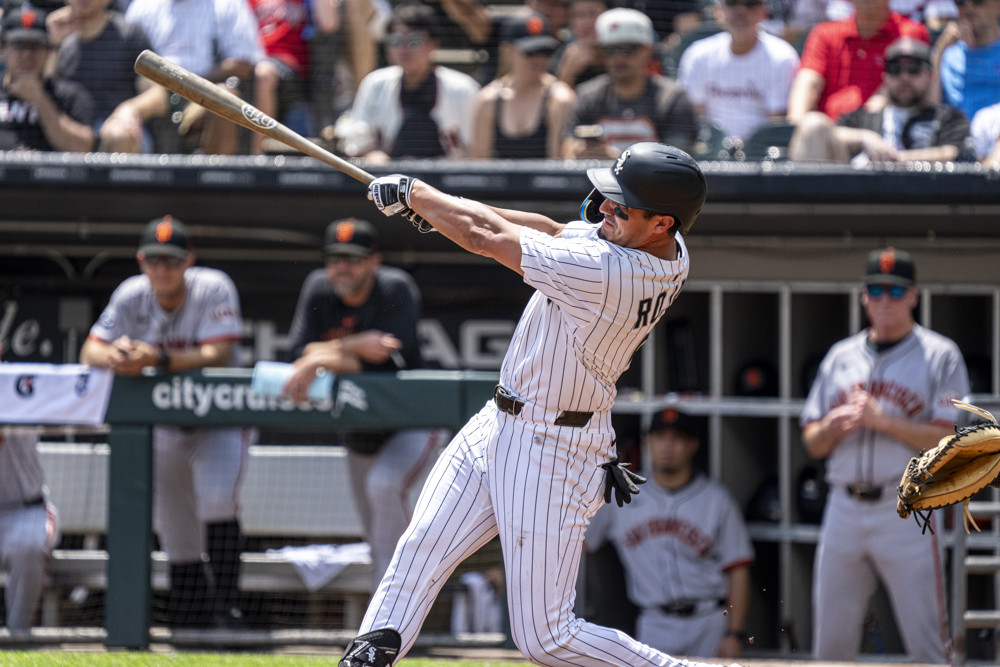While Zack Wheeler theoretically left money on the table by signing with the Phillies instead of the White Sox, he said he never second-guessed his decision.
But even if the faintest doubts lingered, the three-year extension he signed with Philadelphia on Monday would have doused the remaining embers.
With Wheeler entering the final year of the five-year contract he signed in December 2019, the Phillies tacked on an additional three years and $126 million. It's the fourth-largest average annual value in baseball history, and the largest agreed to as an extension (the others were free-agent deals).
The deal will carry Wheeler through his age-37 season. That's not old enough to say he'll retire a Phillie, but he made it sound as though he doesn't want to commit to baseball beyond that, at least this point.
“I do enjoy pitching, and I want to be here,” Wheeler said Monday morning at BayCare Ballpark. “I love competing. But I don't want to play until I'm old-old. And I want to be around my family. But I'm definitely enjoying the moment here, enjoying every moment I take the mound. It's special, and not everybody gets to do it. Not everybody gets to do it as long as I have. I'm grateful for that.”
It's safe to say there's no way in hell the White Sox would make that kind of outlay, so while they are believed to have had an offer over $120 million on the table when Wheeler signed his original five-year, $118 contract, it's now an eight-year, $244 million journey.
This represents the termination point in our ability to project a parallel universe in which Wheeler plied his trade for the White Sox. It also provides an opportunity to wonder where the White Sox and Wheeler would've been at this same moment in time if they'd joined forces.
We previously considered this question a few years ago with Manny Machado. The lessons also applied to Bryce Harper, but we had specific contract figures to explore with the former, whereas Rick Hahn quickly shut down any attempt to pivot to Harper after Machado signed with the Padres.
Between the White Sox's unwillingness to close either of those deals, and the speed with which they let everybody know they offered Wheeler more money, it looks like the kind of silver-medal finish they'd envisioned with Machado. A proud, chest-out second place, not a sheepish, somebody-please-outbid-us-we're-dying-out-here second place. Some might consider that, at best, a distinction without a difference, but Jerry Reinsdorf's priorities are not John Middleton's or Peter Seidler's, and Sox fans suffer greatly for that.
Nevertheless, let's proceed.
The backstory
During the 2019 winter meetings, the Phillies signed Wheeler to a five-year, $118 million contract. Shortly after the news broke, the White Sox leaked word that they offered Wheeler more money than the Phillies -- Bob Nightengale said $125 million -- but Wheeler preferred to stay on the East Coast for personal reasons.
The Phillies structured Wheeler's deal as follows:
- 2020: $21.5M
- 2021: $22.5M
- 2022: $26M
- 2023: $24.5M
- 2024: $23.5M
Reports were that the White Sox offered Wheeler a guaranteed $125 million, not a $125 million that could be met through incentives or exercised/vesting options. Wheeler just preferred to be closer to his wife's family in New Jersey, because they were planning on having kids and wanted to have extended relatives nearby.
The decision was unusual, especially since the White Sox were seen as ascendant, while the Phillies were entering what turned out to be the final year of Matt Klentak's disappointing tenure as GM. Nobody at that point knew the Phillies would demote Klentak and replace him with Dave Dombrowski after the 2020 season, but it made the decision impossible to argue with in hindsight. You have Kenny Williams, Rick Hahn and Reinsdorf on one side, and Dombrowski and Middleton on the other. Which GM and owner would you rather give the four best years of your career to? The annual difference was about the same amount of money AJ Pollock passed up in opting out of the final year of his contract, so if he saw an unlisted tax in taking a chance on the White Sox, he'd have some company.
The financial gap
Once the White Sox missed out on Wheeler, they shifted to Dallas Keuchel, settling on a three-year deal for $55.5 million. The Sox also held a $20 million club option for 2023, but Keuchel didn't even last until June of 2022. The White Sox instead released him, paying out nearly his entire remaining salary and the $1.5 million buyout.
Assuming the White Sox's offer to Wheeler was evenly distributed the way Keuchel's was, and there wasn't any kind of sizable buyout situation at the end of it, the difference in price would've looked something like:
| Wheeler | Year | Keuchel |
|---|---|---|
| $25M | 2020 | $18M |
| $25M | 2021 | $18M |
| $25M | 2022 | $18M |
| $25M | 2023 | $1.5M |
| $25M | 2024 | n/a |
Maybe the Sox structure it in a bell-curve shape like the Phillies did, or maybe they backload it, but if he's making $5 million or $8 million more than Keuchel in a given season doesn't seem like it'd make a huge difference for big-picture acquisitions down the line.
The performance gap
For one year, Keuchel kept pace with Wheeler despite being two and half years older. He posted a 1.99 ERA over 63⅓ innings during the shortened 2020 season, good for 1.5 bWAR and a fifth-place finish in the American League Cy Young race. Even that performance propping up a half-finished 2020 White Sox rotation could have been COVID year phenomenon. Keuchel left his ninth start of that season (a mid-September outing in Kansas City) with back spasms and spent the rest of his White Sox career donning a sizable wrap on his back between innings to keep it loose. He rarely resembled the best version of himself afterward, including his disastrous playoff showing in Rick Renteria's second-to-last game as manager.
Wheeler finished with a 2.92 ERA over 71 innings. More impressive peripherals gave him 2.8 bWAR, but he finished 12th in Cy Young voting because of the less impressive run-prevention results. Perhaps Wheeler makes the statement start in Game 2 of the Wild Card Series against Oakland, but the Sox still had major pitching issues beyond him, and Wheeler wouldn't have solved those. The White Sox front office and Renteria were at odds before Game 3 turned desperate, so I don't think Wheeler saves the manager's job, either.
Over the next three years, it became quite clear why one pitcher required more than double the financial commitment. Wheeler kept rolling along, while Keuchel's wheels came off before reaching the halfway point of his contract with the White Sox.
If the back spasms that hampered Keuchel toward the end of the 2020 season were an inevitable structural issue, there's a decent chance that he doesn't survive the first year intact, either. That just requires a little too much speculation, especially since the next three seasons reinforced Wheeler's age-based advantage regardless. Whether it was the back problem, or the return of the shoulder and neck issues that he dealt with in Houston, being three years older than Wheeler naturally increased the risk of some sort of health issue soiling the picture.
Aside from a handful missed starts in 2022, Wheeler's youth has prevailed. Had the White Sox found a way to sign some other worthy player to a nine-figure contract after the rejection, Wheeler's performance could've inspired confidence. They clearly identified the superior talent on the market and offered more more than any other team. Why not try it again?
That is a rhetorical question.
The opportunity cost
Here's where you have to set aside the butterfly effect, because while you can't assume that everybody would've performed the exact same way with Wheeler in Keuchel's place, you also can't project random disappointments, surprises or injuries. Maybe Wheeler's ability to go deep into games saves wear and tear on the rest of the pitching staff. Maybe he gets hit by a fleeing driver crossing 35th Street, because that's also the sort of thing that happens. It's easier to go with the performances as they unfolded, more or less, because that at least reflects known talent.
Even with Wheeler in the fold instead of Keuchel, the White Sox still might've felt motivated to make the Lance Lynn trade, because the same incentives would've been in place. The White Sox probably still would've lacked bankable pitching outside of Wheeler and Lucas Giolito, and Lynn's contract status (one year, $9.3 million) would've been even more attractive to a team that paid $7 million more for a top-two starter.
Similarly, it's hard to see how the Wheeler/Keuchel swap would've changed the calculus for Carlos Rodon's non-tendering/re-signing on either side. It's possible that $3 million would've been too much for a pitcher they didn't exactly know how to use, but the roster spot was a bigger question than the salary.
In a world where Wheeler delivers his 2021 season with the Phillies, while the rest of the White Sox rotation delivered its seasons, Wheeler makes a considerable difference:
| Actual | G | IP | ERA | bWAR | Theoretical | G | IP | ERA | bWAR |
|---|---|---|---|---|---|---|---|---|---|
| Lynn | 28 | 157 | 2.69 | 5.5 | WHEELER | 32 | 213.1 | 2.78 | 7.5 |
| Rodón | 24 | 132.2 | 2.37 | 5.1 | Lynn | 28 | 157 | 2.69 | 5.5 |
| Giolito | 31 | 178.2 | 3.53 | 4.3 | Rodón | 24 | 132.2 | 2.37 | 5.1 |
| Cease | 32 | 165.2 | 3.91 | 3.0 | Giolito | 31 | 178.2 | 3.53 | 4.3 |
| Keuchel | 32 | 162 | 5.28 | 0.1 | Cease | 32 | 165.2 | 3.91 | 3.0 |
Now, the White Sox ran away with the AL Central even with Keuchel in the fold, but maybe the couple extra wins is enough to tilt home field advantage in their favor against Houston. Wheeler has proven himself to be a capable big-game pitcher. Does his presence make the Sox a tougher out in the best-of-five series against the Astros?
That's probably the biggest inflection point in this alternate reality. If the White Sox are able to win a postseason series or two, and Wheeler lives up to his franchise-record contract all the while, maybe it unlocks some possibilities for greater spending. Even if they lost it in a way that highlighted their offensive flaws, rather than one that emphasized an unraveling pitching staff, perhaps that changes the scope of the White Sox's planning. Maybe Rick Hahn doesn't get so obsessed with the late innings, and instead gets the green light to pursue more imposing solutions to right field or second base.
In a world where the White Sox still lose in relatively short order, the payroll (and imagination) limitations remain in place and Wheeler takes up a bigger chunk of it, then he'd have to paper over a lot of other flaws. The Sox would still have Williams and Hahn making decisions, they'd still probably have an ailing Tony La Russa running things, they'd still have the same defensive limitations, offensive imbalance and injury concerns on the roster.
The best argument is the ever-present weakness of the AL Central. The White Sox ended up losing the division by 11 games, but they were within 1½ games of the Guardians as late as Sept. 9. One could posit that Wheeler in the rotation puts them in first place at some point in the second half by dint of a few longer winning streaks, changing the White Sox's trade deadline strategy and Cleveland's own ambitions.
That theory would just require Johnny Cueto to have the exact same sort of season he gave the White Sox, and while we're ignoring the butterfly effect as best we can, I don't think the Sox could recapture that magic if they replayed the season 99 more times. You don't look one of Cueto's many gift horses in the mouth.
Would Zack Wheeler have changed the White Sox's fortunes?
Possibly. Consecutive division titles, no matter how unconvincing, would've made White Sox history and represented the closest thing they had to sustained success. 2005 is still the only time since the Woodrow Wilson administration that the White Sox won a postseason series, so even an ALCS appearance would've been massive, although the absence of fans in 2020 would've limited the financial windfall.
In a world where the White Sox's shortcomings are still too big of a hindrance, and Wheeler can't propel the Sox beyond a more competitive ALDS loss to the Astros and a slightly less frustrating second-place experience in 2022, the differences look minor, although still interesting. With his $25 million on the books, the White Sox might not have had the resources to pay Andrew Benintendi, even though Benintendi's five-year, $75 million deal wouldn't represent the sad franchise record it currently is. With Wheeler etched into the rotation, the Sox probably dodge the whole Mike Clevinger mess.
I'd guess they'd never reach the ugliness of the 101-loss disaster of 2023, but the roster was still headed toward a cliff with the speed of their approach being the only variable. And if they were in anything resembling their current situation, Wheeler probably isn't on the White Sox anymore. A Dylan Cease trade feels certain, and he still has two years of team control. On an expiring deal, Wheeler would be as good as gone. The bigger question is, if the White Sox never bottomed out like they did last year, would Kenny Williams and Rick Hahn be the guys trading him?





